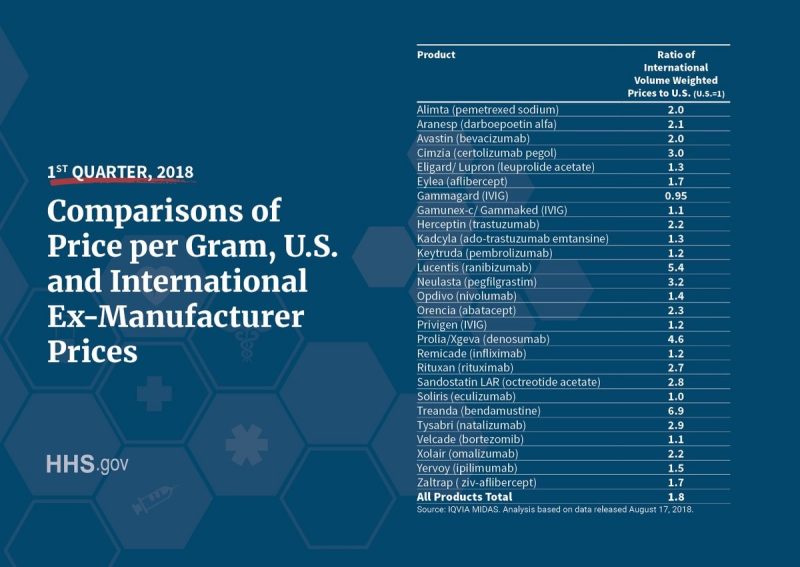Health Care Roundup: New Medicare Drug Pricing Proposal; New ACA Waiver Guidance; High Price of Precision Medicine; Midterms; More
Subscribe to our email list and receive these updates in your email box each week »
HEALTH CARE HIGHLIGHTS
A Week of Proposals and New Regulations
This week, there were several regulations and proposals announced by the Trump Administration that would impact health care in the U.S.
The announcement that made the biggest splash was revealed yesterday and would require drugs administered by physicians and paid for by Medicare, known as Part B drugs, to be priced based on the prices paid in other advanced industrial nations. The proposal announcement came hours after a report was released by HHS that compares prices charged by drug companies in the U.S. with prices they charge in other countries. “Overall, prices and reimbursement rates for Part B drugs are significantly higher for U.S. providers than purchasers outside the U.S,” the report said. NCCS is analyzing the proposal to understand how it would affect patients’ out-of-pocket expenses and access to care.
Aspects of the proposal were drawn from a similar Obama-era proposal and it comes less than a week after another drug pricing proposal was announced that would require drug makers to include the price of drugs in direct-to-consumer (DTC) television advertisements. Read NCCS’ statement on the DTC advertising proposal here.
New CMS Guidance Threatens Pre-Existing Condition Protections
On Tuesday, CMS released new guidance that significantly alters the standards that states must meet in order to be granted a waiver from certain Affordable Care Act (ACA) requirements. The Trump administration would permit states to revise the rules of their health insurance markets significantly, including to authorize the use of ACA premium subsidies for short-term insurance plans and association health plans that do not meet ACA benefit standards.
Although the administration maintains that the guidance will still require states to adhere to the guardrails of the ACA that relate to comprehensiveness of coverage, affordability of coverage, and the number of individuals insured, in practice the guidance will bifurcate the insurance markets and deny people with pre-existing conditions access to affordable and adequate insurance options. Healthier Americans will likely choose less expensive insurance options, including short-term plans and association health plans, especially if they can use premium subsidies for their purchase.
Cancer patients will be especially hard-hit if they are left in an insurance market that includes only older and sicker consumers. In response, NCCS joined more than 25 patient and consumer groups in a statement urging CMS to withdraw this guidance.
IMPORTANT READS
High price of precision medicine forces cancer patients to make agonizing choices
USA Today
We find ourselves in the early stages of new cancer treatments, including precision medicine and immunotherapies. While these new treatments offer hope to many patients, being on the frontline of innovation certainly comes with risks, including physical and financial. This article highlights the difficult choices patients must make, especially now until these new treatments are adopted by insurance companies as standard treatment.
“Precision medicine is one of the most celebrated areas in cancer research. But the high cost of cutting-edge tests and treatments is threatening to keep it out of reach for many patients.”
In Days Of Data Galore, Patients Have Trouble Getting Own Medical Records
Kaiser Health News
This article is a great reminder that patients have the right to obtain their own medical records. However, despite the law, it continues to be difficult for patients as the study in the article highlights. This is particularly relevant for cancer patients, who need access to their medical records to obtain second opinions and are often tasked with coordinating their own care.
Trump’s drug plan falls flat in health care messaging war
By Dan Diamond, Politico
In races across the country, Democrats continue to focus on health care. As the article points out, “Democrats had an 18 point advantage among voters on health care compared to Republicans, according to a Washington Post/ABC News poll.”
“President Donald Trump tried Thursday to make good on a campaign vow to lower drug prices — attacking ‘foreign freeloaders’ and proposing significant changes to how Medicare pays for many drugs. But his populist proposal didn’t appear likely to budge the national debate around health care, just days ahead of the midterm elections.”
The Role Health Is and Is Not Playing in the Midterms
By Drew Altman, Kaiser Family Foundation
While health care is getting a lot of attention leading up to midterms, it is not a single issue voters base their decisions on generally speaking.
That said, the article points out what is at stake concerning health care policy moving forward depending on the results of these elections.
Related Posts
https://canceradvocacy.org/blog/health-care-roundup-oct-19-2018/
https://canceradvocacy.org/blog/health-care-roundup-oct-12-2018/



